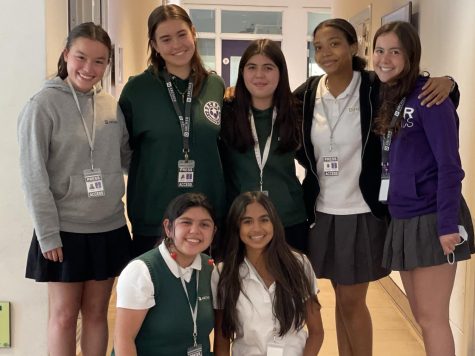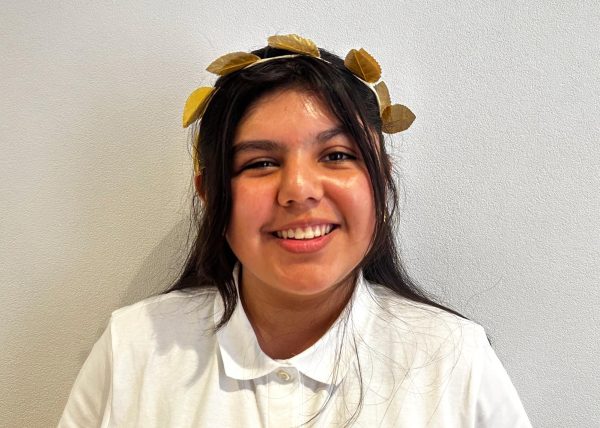Editorial: An editorial board’s purpose
Photo credit: Maia Alvarez
A reporter’s notebook and recording device is a must have for each individual on The Oracle. As an editorial board, we hold the responsibility of not only editing each piece on The Oracle, but also deciding what we wish to cover. Graphic Design by Maia Alvarez
December 15, 2022
Over the summer, The Oracle’s editorial board read “The Elements of Journalism: Updated 4th Edition” by Bill Kovach and Tom Rosenstiel, to take a closer look at how important journalism is during a time of misinformation and fake news and how technology can support our reporting. When focusing on the different roles journalism has, the book states, “who is making decisions over the often limited investigative resources of a newsroom will inform what threads reporters follow, whom they decide to hold accountable, how stories are framed and whom their stories are most likely to affect.”
As the 2022-2023 Editorial Board for The Oracle, we are the ones who see the value of scholastic journalism firsthand and make the major decisions for our publication to benefit the greater community. We knew, since the moment we were inducted into the publications program, we must accept our role as student journalists by being a pillar of our school’s democracy. Stepping into our roles as editors during the first semester, we’re been asking ourselves: What is our unique editorial board voice?
Scholastic Journalism’s Importance
As Archer’s resident changemakers, we understand scholastic journalism is not to be taken lightly. Scholastic journalism gives students the opportunity to improve their writing ability, critical thinking skills and overall confidence — all things students can take with them to college and beyond. With the rise of technology, students can use the devices in their pockets to record and report at a moment’s notice. All the while, social media can spread a publication’s stories beyond its campus walls. Scholastic journalism a documentation of student life at a school as well as reporting that can stimulate courageous conversations, which create action for issues within our community and beyond.
While we enjoy press freedom on our campus, scholastic journalism is still under fire around the country today.
In a previous editorial, we discussed the erupting censorship of books within school communities, which instills close-mindedness and deprives students of their right to education. The censorship in scholastic journalism takes this a step further: not only are journalists being deprived of their right to protected speech, but they are being deprived of informing their peers on serious issues and potentially empowering them to take action.
We know we are fortunate to help lead a publication without any censorship. We are able to decide exactly what stories are published, what angles we want to focus on and what stories should be written before others.
How the Oracle Operates
To quote our mission statement from The Oracle’s staff manual — a living document that gets revised with each editorial board — we “provide a forum that encourages authentic voices and discussion in our increasingly diverse educational community. We serve as a resource for the Archer community and beyond to report relevant, interesting and newsworthy information.”
With a staff consisting of editors, columnists, and senior and staff reporters, The Oracle writes stories in any of five sections: News, Features, Sports, Culture and Voices. Additionally, video and audio elements known as multimedia get added into stories when appropriate or appear as podcasts and broadcasts within the publication.
To begin any story, a reporter either asks an editor what stories need to be written or generates an idea based on school or current events. Once the initial angle is solidified, reporters add their stories to our Trello workspace and our deadline document. Between when the idea is solidified and the first round of editing, reporters do a combination of generating background research, interviewing sources, taking photos for the story’s featured image and drafting in WordPress, the software The Oracle uses to publish all of its stories.
With the help of Trello, many rounds of editing happen between the section editor, editor-in-chief and our journalism advisor, Kristin Taylor, who suggests edits for pieces, but the editor-in-chief makes the final decision to publish.
The Editorial Board Voice
The purpose of an editorial board is not just to have student leaders edit each section of the publication and the editor-in-chief to edit and decide when a piece is ready to be published. As a collective body, the board’s purpose is to “make all decisions that pertain directly to Archer student media and their interests,” therefore ensuring the student voices of the community are within our publication.
We are fortunate to have a staff of 25 this year and five independent columnists — the largest staff to date — writing for all sections. We can have more coverage of events, unique spotlights and localized news. Now more than ever, we have a great responsibility in deciding the voice we shall speak with on the publication.
Each member of our board holds their own passions and aspirations for the future. There are editors who are also tennis and soccer players, who are also leaders of Hermanas Unidas and Black Student Union. Through intersectionality comes a kaleidoscope of ideas and perspectives.
There is never going to be another editorial board like this one.
There is never going to be any staff on The Oracle like this one.
So back to our question: What is our unique editorial board voice?
It’s a voice that’s curious, determined and ambitious.
It’s a voice that seeks truth, remains transparent and acts ethically.
It’s a voice that’s a collective voice of fresh, young people, striving to amplify the voices of our peers and ourselves.
And this voice is only amplified with your help. By reading our stories and subscribing to the weekly newsletter, you can stay informed about the school community and localized news. By responding to our emails for interviews, giving authentic answers during those interviews and writing Letters to the Editor about the topics that interest you, you can share your views on our platform and be a part of a larger narrative.
The Oracle is the place to turn to for the latest happenings at Archer and the local and global issues we as a community care most about. But there is no community without you.
So keep reading The Oracle, and, from News to Voices, see how we amplify Archer’s unique and authentic voices.










